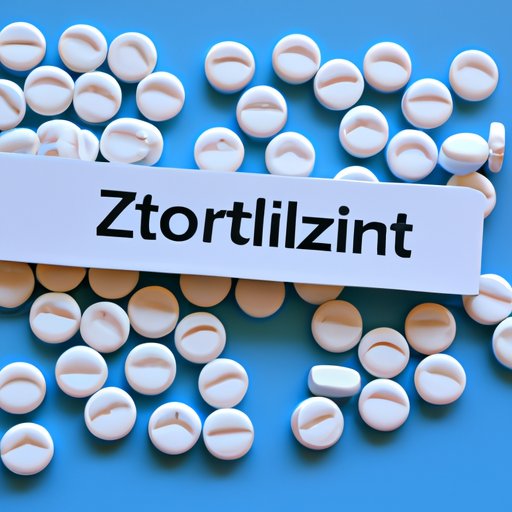
Does Zoloft Make You Sleepy?
Zoloft, also known as sertraline, is a medication commonly prescribed for depression, anxiety, obsessive-compulsive disorder, and other mental health issues. While it is effective for many individuals, Zoloft can also have various side effects, including drowsiness. In this article, we will explore the connection between Zoloft and sleepiness, examine the reasons why drowsiness may occur, and provide tips on how to manage this side effect.
The Side Effects of Zoloft: Does It Really Make You Sleepy?
Zoloft is a selective serotonin reuptake inhibitor (SSRI), a type of medication that works by increasing the levels of serotonin in the brain. Serotonin is a neurotransmitter that regulates mood, sleep, appetite and other bodily processes. While Zoloft is an effective medication for many people, it can cause side effects, such as dry mouth, nausea, diarrhea, headaches, and dizziness. One of the most common side effects of Zoloft is sleepiness.
Exploring the Relationship Between Zoloft and Sleep: Understanding Why Individuals May Experience Drowsiness
The connection between Zoloft and drowsiness is complex and not fully understood. However, researchers have found that Zoloft can affect the neurotransmitters in the brain that regulate sleep. Zoloft also has a sedative effect, which may contribute to drowsiness in some people. Additionally, the dose of Zoloft can affect its side effects, including drowsiness.
Individual factors can also influence the development of drowsiness as a side effect of Zoloft. For example, people who are older, have underlying health conditions, or are taking other medications may be more likely to experience drowsiness. Additionally, certain lifestyle factors, such as drinking alcohol or not getting enough sleep, can exacerbate the drowsiness caused by Zoloft.
Does Zoloft Increase Drowsiness? Here’s What Studies Say
Several studies have examined the relationship between Zoloft and drowsiness. One study found that drowsiness was a common side effect of Zoloft, affecting approximately 10 percent of people taking the medication. Another study found that drowsiness was more likely to occur at higher doses of Zoloft. However, not all research has found a significant link between Zoloft and drowsiness, highlighting the importance of individual factors in experiencing this side effect.
It is worth noting that the potential benefits of taking Zoloft may outweigh the risks of experiencing drowsiness. For individuals who experience significant improvement in their mental health while taking Zoloft, drowsiness may be a small price to pay for the overall benefits of the medication.
The Impact of Sleep-Related Side Effects of Zoloft
While drowsiness may seem like a minor side effect, it can have a significant impact on an individual’s daily life. Excessive sleepiness can interfere with work, school, and other important activities, making it difficult to concentrate or complete tasks. It can also affect relationships with friends and family, as well as physical health. Lack of sleep can lead to increased risk of accidents, decreased immune function, and other health problems.
Finding the Right Balance: Coping with Drowsiness While Taking Zoloft
If you are experiencing drowsiness as a side effect of Zoloft, there are several things you can do to manage it. First, make sure to get enough sleep each night. Cutting back on caffeine and alcohol can help improve sleep quality and reduce drowsiness during the day. Additionally, taking Zoloft at night rather than in the morning may help reduce drowsiness.
If these strategies do not work, talk to your doctor about adjusting the dose of Zoloft or switching to a different medication. It is crucial to communicate with your doctor about any side effects you are experiencing and to work together to find the treatment that is best for you. Also, keep in mind that it may take some time to find the right medication and dosage that works for you.
Conclusion
In summary, Zoloft can cause drowsiness as a side effect. The connection between Zoloft and sleepiness is complex, and individual factors can influence the development of this side effect. While drowsiness can have a significant impact on daily life, there are strategies to manage it, such as improving sleep habits, adjusting the dose of Zoloft, or switching to a different medication. It is important to talk to your doctor about any side effects you are experiencing to find the best treatment for you.




